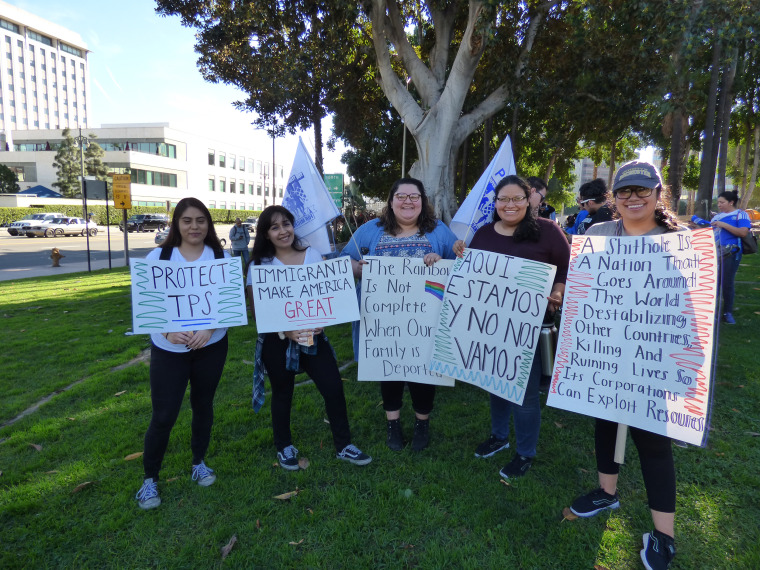A group of Temporary Protected Status (TPS) holders and their U.S. citizen children spoke out in court in support of a ruling that blocked the Trump administration from ending their families' protected immigration status.
At a hearing on Wednesday at the Ninth Circuit Court in Pasadena, California, the families asserted that the administration's intent to end TPS for hundreds of thousands of immigrants is “fueled by racial animus."
The lead plaintiff in Ramos vs. Nielsen is Crista Ramos, who is 15 and a high school student.
“I only learned about TPS when the president tried to end it for my mom,” she said in a statement. “But as a child of a TPS holder, I didn’t think twice about standing up to the president to defend my mom and our family.”
Ramos, who wants to be attorney someday, is worried that her mother, who is from El Salvador, will lose her legal immigration status if TPS protections are ended for Salvadorans, despite the dangerous conditions in the country. Her mother has been a TPS holder for 17 years and has lived in the U.S. for the last 26 years.
Pres. Donald Trump’s rhetoric surrounding immigration, including referring to certain places as “sh-thole” countries, claiming Haitians “all have AIDS” and calling Mexicans rapists, demonstrate that his administration is motivated by racial hostility, say the plaintiffs in Ramos v. Nielsen.
Since President Donald Trump took office in January 2017, his administration has announced they would end TPS designations for immigrants from El Salvador, Haiti, Nicaragua and Sudan. Congress established the TPS program as a form of humanitarian relief through the Immigration Act of 1990, giving immigrants from certain countries that went through war or natural disasters temporary legal status since it was too dangerous to return to their countries at that time.
The administration argues that conditions in some of the countries, such as the aftermath of an earthquake or civil war, have changed, so TPS is no longer necessary.
But previous administrations took a different view, extending TPS status when deadlines came due, allowing families to stay in the U.S. for decades and raise families. Besides, say advocates, conditions in many of these countries are still not safe.
The plaintiffs argue that “DHS’s TPS terminations were based on an arbitrary interpretation of the TPS statue, breaking with decades of prior practice without explanation,” according to the lawsuit.
Putting children in an "impossible" situation
More than 270,000 U.S. citizen children have at least one parent with TPS. Advocates argue that terminating TPS designations for such parents puts children in an “impossible” situation by forcing them to either leave their home country or live without their parents.
On Wednesday, as several families and attorneys were in court, hundreds marched and rallied in front of the courthouse.
“Their constitutional rights are being violated and families have been living in fear,” Martha Arevalo, executive director of Central American Resource Center (CARCEN), a nonprofit immigrant advocacy organization, told NBC News. “Ending TPS will become the newest form of U.S. family separations; it is cruel and immoral.”
The majority of the case’s plaintiffs have lived in the U.S. for decades and have built a life, paid taxes and helped build up their communities, advocates argue.
To be eligible for TPS, individuals must meet stringent requirements, including continued residence in the United States, lack of disqualifying criminal history and submission of extensive documentation, an application and fees.
Advocates acknowledge that it is, as its name suggests, a temporary solution and that other, more permanent pathways of legal immigration must be enacted.
“TPS is not a permanent solution. The people who have it live in temporary status for a very long time,” Arevalo said. “They live in limbo.”
She suggests that the permanent solution lies with legislation, citing The American Dream and Promise Act, which provides provisions for Dreamers and those with TPS status to gain citizenship. The bill passed in the House of Representatives in June, but has not yet passed in the Senate.
“We’re fighting to stay together so that I can continue to provide for my children and see them achieve their dreams,” said Donaldo Posadas, a TPS holder from Honduras, in a statement.
Follow NBC Latino on Facebook, Twitter and Instagram.


